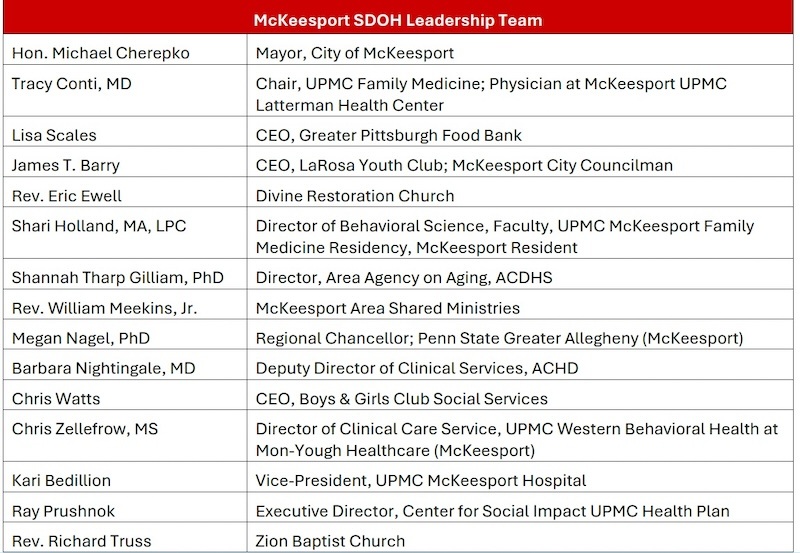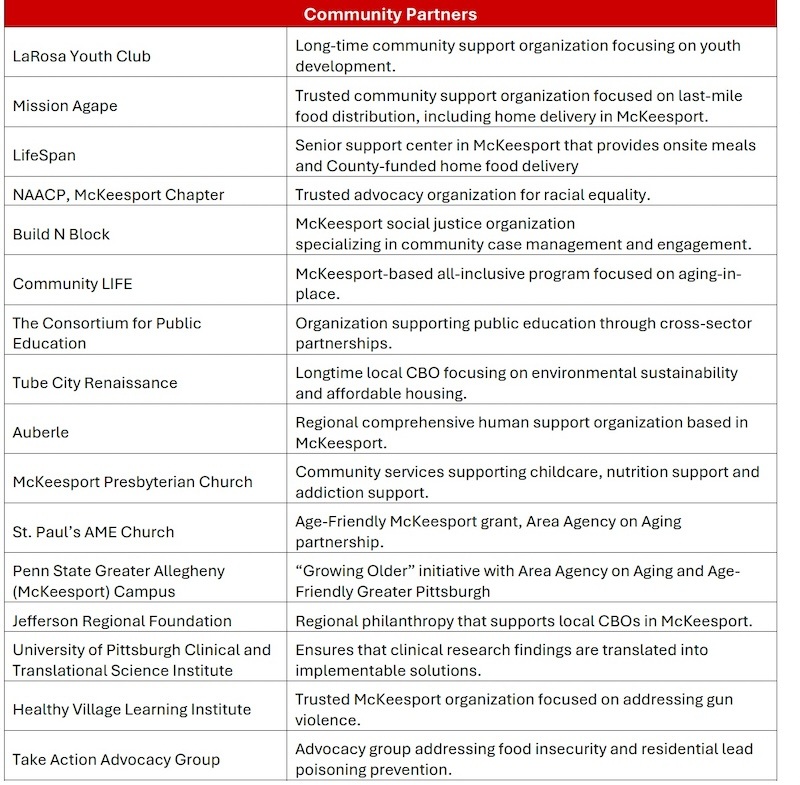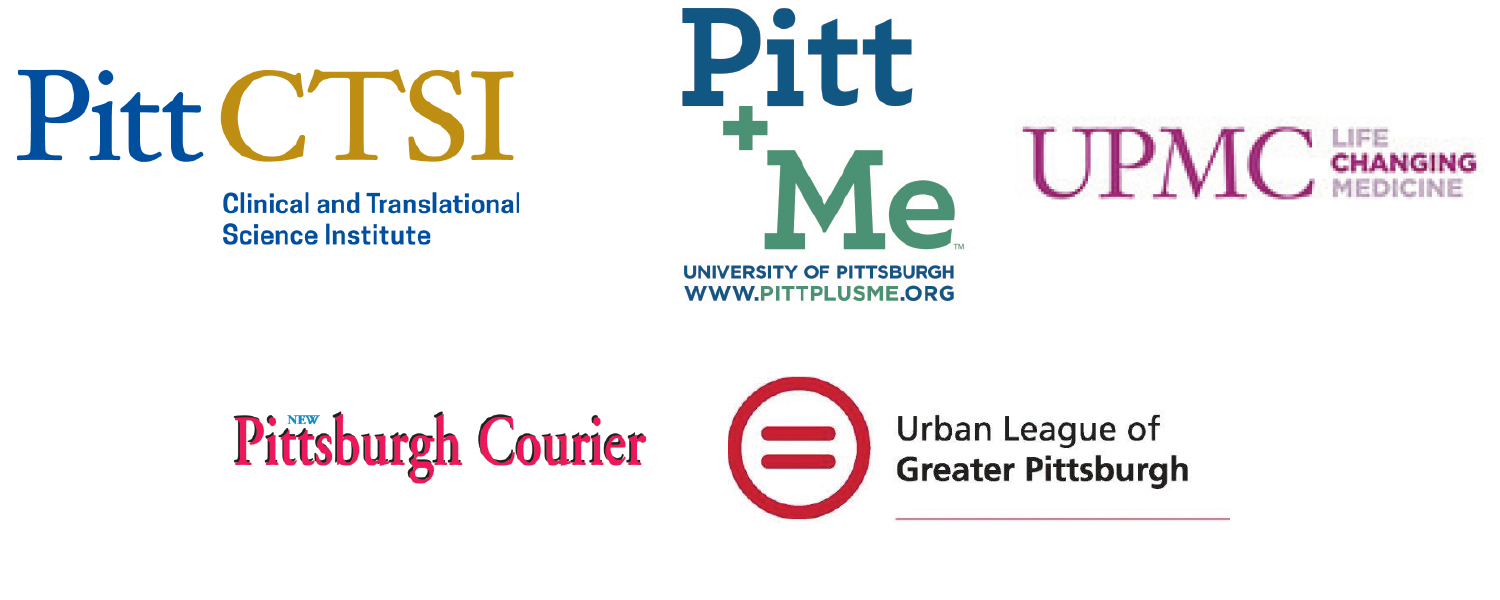U.S. reliance on food assistance is rising as more people grapple with economic hardship. Spencer Platt/Getty Images
“When I was a boy and I would see scary things in the news, my mother would say to me, ‘Look for the helpers. You will always find people who are helping.’”
― Fred Rogers
When Pittsburgh’s steel industry collapsed in the 80s, the city of McKeesport felt the effects mightily. Just one example is the drop in population, which plummeted from a height of 55,000 in the 1950s to about 18,000 in 2020.
Today, many of those residents are elder Black and Indigenous People of Color (BIPOC) who suffer unequally from preventable health conditions like diabetes, high blood pressure, and hearing, vision, and mobility issues. They’re hospitalized from these disorders at a rate five times higher than the rest of Allegheny County.
Residents also experience higher poverty and food insecurity rates with 45.1% of children in McKeesport living below the poverty level, compared to 14.5% countywide.
All this suffering is the result of historical and day-to-day structural inequity and discrimination. However, a new evidence-based plan is hoping to receive funding to transform social determinants of health (SDoH) into resources of well-being. (SDoH are the conditions in which people are born, live, learn, work, play, worship, and age.)
The plan, titled Bridges to Care, is positioned to attract that funding from foundations and government at all levels. It puts health-fairness first and empowers local leaders to work together to address unmet needs and create sustainable systems that will transform McKeesport’s health outcomes.
Best of all, Bridges to Care was created by “helpers” who were already working separately on behalf of McKeesport’s well-being.

Look for the helpers
Thanks to a CDC grant, these helpers have created a plan to come together logistically, strategically, and financially. When the plan is funded, it will begin to restore McKeesport’s health, vibrancy, and security. Ultimately, Bridges to Care will also attract businesses, jobs, and affordable housing to McKeesport — and serve as a model for other struggling communities throughout our region.
Building on McKeesport’s resilience and creativity
Despite McKeesport’s struggles, its residents have never lost their sense of solidarity, caring, and toughness. Unlike other studies that lack input from residents, the Bridges to Care plan is based on residents’ creative ideas and lived experiences, including its most vulnerable members.
Through seven in-person community listening sessions and an online survey, Bridges to Care creators learned what matters to residents. That includes the role of churches, parks, and youth social clubs and sports in their health and well-being. Their appreciation for small, local businesses that contribute to their economy and community spirit, as well as the town’s history. Their desire for more community gardens to grow healthy food and foster community interaction, mental health, and violence prevention.
Bridges to Care creators also learned that while residents understand the link between healthy food and improved health, these foods are more expensive and harder to get, including time and transportation to and from food banks and grocery stores.
All this listening and gathering of ideas and needs is well-founded, but only if the information is used to develop programs that are funded, implemented, supported — and lead by the community itself.
Once it’s funded, Bridges to Care, will rely on an interconnected, community-driven, hyper-local support system that brings existing resources to people who need help the most.
This “bottom-up” approach is different than a traditional “top-down” approach where people in need must somehow find and figure out how to use resources on their own.
Fully-funded, Bridges to Care programs will be led by a community-based organization (CBO) or a group of organizations with city and county support. The goal is to attract and align local and regional resources into a powerhouse of purpose.
To do that, the CBO(s) will give voice, funding, and power to organizations that have direct experience with the inequities they’re dismantling in two key areas: Food and nutrition security and community-clinic links.

Food and nutrition security
When funded, the food category will include a Neighborhood Health Equity Action Leader (HEAL) program in each of McKeesport’s 12 wards. Each HEALr will receive free training and money to support their work. These individuals will be well-known and trusted in their neighborhoods and serve as a point of contact for available food security and healthcare resources.
Four McKeesport Community Health Workers (CHWs) will receive training and be employed full-time to support the HEAlrs and provide residents with public benefits enrollment, social service referrals, and promotion of healthy behaviors, including mental health.
A Mobile Grocery Program will increase access to fresh, healthy foods via SNAP and other public assistance programs, and subsidize fresh produce and meat.
A Community Garden Program will expand the number of gardens across McKeesport. School students, youth organizations, churches, and others will volunteer and teach in the gardens. In partnership with health systems and county human services, the gardens will connect residents to the idea of “food as medicine.”
The final food security program will be the Last-Mile Food Delivery Expansion. Working together with local food partners, Bridges to Care will lower barriers to finding and accessing healthy food, including transportation, emergency preparedness, and consistency issues. Food as medicine will be part of the expansion.
Community-clinic links
In addition to food security programs, Bridges to Care will Expand Mobile Health Opportunities for vaccinations, health visits, and screenings. CHWs will also provide follow-through after mobile health events.
The plan will also collect and use data from the programs to support community input, track health outcomes, and ensure accountability. A partnership between the CBO(s) and the University of Pittsburgh’s Clinical and Translational Science Institute will co-design metrics and data-gathering tools.
Bridges to Care creators are confident their plan to weave together existing and new resources, that make services more convenient and effective, will attract attention and funding. The plan’s evidence-based programs and members are already proving that better lives build stronger communities.
For more information, contact Dom Anselmo at Danselmo@kiresources.com.
